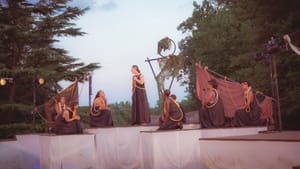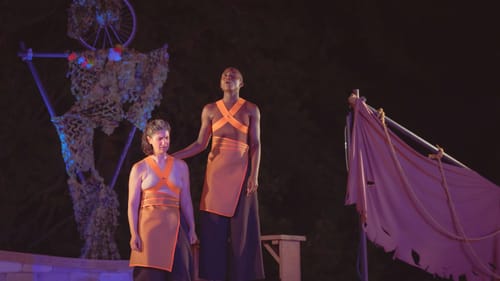Stay in the Loop
BSR publishes on a weekly schedule, with an email newsletter every Wednesday and Thursday morning. There’s no paywall, and subscribing is always free.
This textual triumph is especially stirring in an election year
Delaware Shakespeare presents Julius Caesar

This summer, all roads lead to Rome, as portrayed by Delaware Shakespeare in Wilmington’s Rockwood Park. For its 22nd year of outdoor theater, the company opened with a finely mounted production of Julius Caesar, one of the Bard’s shorter plays—and one of his darkest.
In ancient Rome, a confident Julius Caesar (Sarah Stryker) and protégé Mark Antony (Mariah Ghant, also the Del Shakes artistic director) return victorious. A group of senators, led by Caius Cassius (Emily Schuman), fear that he will be named emperor, putting an end to the Roman republic. So, securing the support of popular and well-regarded Marcus Brutus (Satchel Williams), the disaffected senators plot to assassinate Caesar, who has seemingly refused a crown but comports himself like a king.
A soothsayer (Stevie Smith Iannettoni) warns the returning hero to “beware the Ides of March,” (the 15th), and Caesar’s wife Calpurnia (Rachel O’Hanlon Rodriguez) cites prophetic dreams and urges him to stay indoors. But flattery convinces Caesar to go anyhow to the capitol, where the senators assassinate him. As Brutus gives the final blow, a dying Caesar utters one of the play’s most famous phrases to his former friend: “Et tu, Brute?”
Brutus generously (and ill-advisedly) allows a grieving Antony to speak at Caesar’s funeral, where his skilled rhetoric turns the crowd against the conspirators and foments revolution. Antony and returning general Octavius (Lex Thammavong, who also gives a feisty portrayal of Portia, Brutus’s wife) wage war on Brutus and Cassius, who are defeated, and bowing to Roman tradition, accept their deaths by falling on their swords.
Textual triumphs
This tragedy’s dark themes and darker deeds seem to be at odds with an out-of-doors festival atmosphere. But working on Andrew Robinson’s excellently conceived multi-level set, experienced director Tai Verley skillfully guides her gender-expansive cast to explore the play’s (albeit few) lighter textual moments while pulling the audience deeply into the play’s disturbing depths.
One of the highlights of the evening is the company’s first-rate handling of Shakespeare’s politically charged text, especially dense in Julius Caesar, and so kudos are due to text coach Cassandra Alexander. The complex explicatory set-up as the conspirators gather to plot, which can easily become muddled, is perfectly clear and easy to follow.
All the play’s major characters are gifted lengthy, often poetic monologues that also carry backstory and plot details, and without exception, these were excellently interpreted and delivered with clarity and conviction: Schuman’s chilling exhortation that “the fault ... is not in our stars but in ourselves that we are underlings”; Williams’s thoughtful deliberation of the political situation (“let’s kill him boldly but not wrathfully”); and Stryker’s “lean-and-hungry look” assessment of Cassius (“such men are dangerous; I do not trust them”).

The play’s greatest rhetorical passage (always highly anticipated) is stirringly delivered and perfectly modulated by Ghant as Antony, whose speech beginning “I come to bury Caesar, not to praise him” cannily cites the “honorable men” who killed the returning hero and works the crowd to a frenzy, well-portrayed by company members scattered in the audience.
Production challenges
One of the play’s problems is that midway during the work—in Act III of the five-act play and just before intermission in this production—its building suspense culminates in Caesar’s assassination, and the title character disappears. The play’s second half, devoted to the war between the conspirators and Antony’s forces, blurs into a series of repetitive and confusing battles, interpreted by Colleen Hughes’s dance-infused choreography that is interesting but often stops the play’s forward motion.
Michael Hahn, a frequent Del Shakes collaborator, creates original music and a highly effective sound design with everything from thunderous drum rolls to surprising and brittle tangos, played live by violinist Christina Foye. Ilycia Boatwright-Buffaloe’s striking costumes include Roman senators clothed in flowing black togas accented with swathes of differently configured gold braid, and the change into battle wear is cleverly accomplished with colorful crossed bands that referenced armored breastplates.
Unfortunately, the costumes and their wearers are often hard to see against the dark background of Rockwood’s towering trees, a situation compounded by Isabella Gill-Gomez’s often puzzling lighting. Perhaps attempting to mirror the dark deeds of the play, she lights the stage very dimly, making it often challenging to discern the characters’ actions. For the curtain call, bright white lights are bumped up, showing us what we might have missed.
A stirring pick for an election year
Opening night (July 19) was actually the first performance; previews were curtailed by the blistering weather. Robert Tombari, the company’s new managing director, gave the enthusiastic audience a rousing welcome and introduced the company’s lively apprentices to set the scene. July’s “thunder moon” rose through the towering branches during Antony’s impassioned “Friends, Romans, countrymen” speech and appeared on cue as Ghant detailed Brutus’s “most unkindest cut of all,” offering additional visual resonance.
Throughout, Verley and her cast tellingly explore Julius Caesar’s evergreen political relevance without overt contemporary references, though the sense of uncertainty in an election year—especially this one—slots rather neatly into this Shakespeare play and undergirds a stirringly spoken production.
What, When, Where
Julius Caesar. By William Shakespeare, directed by Tai Verley. $23-$45 Thursday to Sunday; Wednesdays are pay-what-you-will. Through August 4, 2024, at Rockwood Park, 4671 Washington Street Extension, Wilmington. 302-468-4890 or delshakes.org.
Accessibility
The festival area is wheelchair-accessible; it is necessary to traverse a gravel walkway and the grass lawn seating area.
Sign up for our newsletter
All of the week's new articles, all in one place. Sign up for the free weekly BSR newsletters, and don't miss a conversation.

 Gail Obenreder
Gail Obenreder